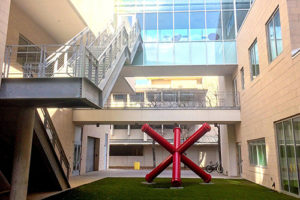STUDENTS EXAMINE THE INTERSECTION OF CULTURE AND TECHNOLOGY
The role of technology in culture, work and regional economies has become more important and complex in the last two decades. Leaders at the University of Texas at Dallas (UTD) saw the need for greater research, workforce training and programming to ensure the DFW Region is leading the way in future work.
In 2015, UTD created the School of Arts, Technology, and Emerging Communication (ATEC) to engage artists, designers, scientists, researchers and reflective practitioners across multiple disciplines in collaborative activities to create new knowledge, explore the expressive possibilities and assess the cultural impact of emerging technologies.

“Our goal in ATEC is to encourage students to think complexly about technology, about culture and about the many ways in which the two are inextricably entangled,” says Dr. Anne Balsamo, dean of the school, Arts and Technology Distinguished University Chair, and Arts and Humanities Distinguished Chair, on the program website.
Students, faculty and researchers collaborate on Intentional Future-Making through the creation of new cultural forms, the design of new technological experiences and the transformation of the culture industries. The cross-discipline work at ATEC has already created recognized technological advances.
The Center for Modeling and Simulation and the Virtual Humans and Synthetic Societies Lab, both led by ATEC professor Dr. Marjorie Zielke, have developed an emotive “Virtual Reality Patient,” in conjunction with Southwestern Medical Foundation, that medical students are able to use to improve patient communication skills. The center also has received a clinical trial planning grant from the National Institutes of Health to explore virtual reality graded exposure therapy for those with chronic back pain.
ATEC’s success with 3D VR gained notoriety and created opportunities for partnerships and grants from top national intelligence organizations. The First Person Cultural Trainer project teaches soldiers the values and norms of Iraqi and Afghan cultures, develops the Army’s soldier and civilian leaders, and is supported and sponsored by the U.S. Army Training and Doctrine Command G-2 Intelligence Support Activity.
This article is part of the 2020 Higher Education Review Magazine.